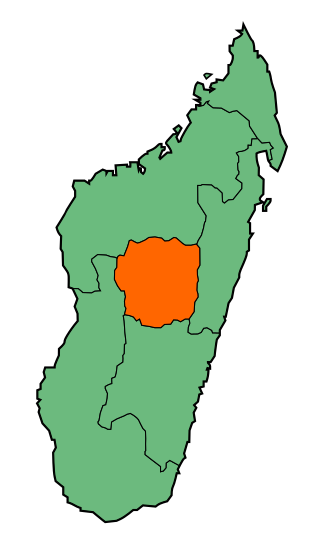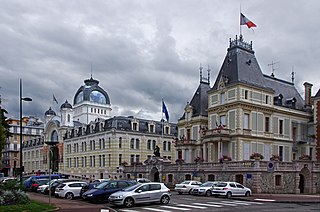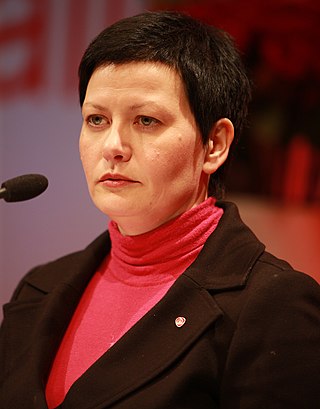Related Research Articles

Madagascar, officially the Republic of Madagascar, is an island country comprising the island of Madagascar and numerous smaller peripheral islands. Lying off the southeastern coast of Africa, it is the world's fourth largest island, the second-largest island country and the 46th largest country in the world. Its capital and largest city is Antananarivo.

Local government is a generic term for the lowest tiers of governance or public administration within a particular sovereign state.

Antananarivo, also known by its colonial shorthand form Tana, is the capital and largest city of Madagascar. The administrative area of the city, known as Antananarivo-Renivohitra, is the capital of Analamanga region. The city sits at 1,280 m (4,199 ft) above sea level in the center of the island, making it the highest national capital by elevation among the island countries. It has been the country's largest population center since at least the 18th century. The presidency, National Assembly, Senate, and Supreme Court are located there, as are 21 diplomatic missions and the headquarters of many national and international businesses and NGOs. It has more universities, nightclubs, art venues, and medical services than any city on the island. Several national and local sports teams, including the championship-winning national rugby team, the Makis, are based here.

Marc Ravalomanana is a Malagasy politician who served as the sixth President of Madagascar from 2002 to 2009. Born into a farming Merina family in Imerinkasinina, near the capital city of Antananarivo, Ravalomanana first rose to prominence as the founder and CEO of the vast dairy conglomerate TIKO, later launching successful wholesaler MAGRO and several additional companies.

Antananarivo Province is a former province of Madagascar with an area of 58,283 square kilometres (22,503 sq mi). It had a population of 5,370,900 in 2004. Its capital was Antananarivo, which is also the capital of the country. Established in 1965, it was the most important province of Madagascar in terms of industrial production. It was one of the most literate provinces and was dominated by the Merina people. Along with the other five provinces, it was abolished in 2007 after a referendum in favour of creation of smaller regions to help in development was approved. It was badly affected by plagues in the 20th century. In 2002 a state of emergency was proclaimed by the then president Didier Ratsiraka. The events that followed led to the other five provinces announcing the creation of a new republic that would have excluded Antananarivo Province. Peace was restored only when Marc Ravalomanana was installed as the country's president.
A territorial collectivity, or territorial authority, in many francophone countries, is a legal entity governed by public law that exercises within its territory certain powers devolved to it by the State as part of a decentralization process. In France, it also refers to a chartered administrative division of France with recognized governing authority. It is the generic name for any territory with an elective form of local government and local regulatory authority. The nature of a French territorial collectivity is set forth in Article 72 of the Constitution of France (1958), which provides for local autonomy within limits prescribed by law.

An administrative centre is a seat of regional administration or local government, or a county town, or the place where the central administration of a commune, is located.
A municipal council is the legislative body of a municipality or local government area. Depending on the location and classification of the municipality it may be known as a city council, town council, town board, community council, rural council, village council, or board of aldermen.

Helga Pedersen is a Norwegian politician, former Minister, and member of the Storting, who served as the deputy leader for the Labour Party from 2007 to 2015. A native of Sør-Varanger Municipality, she served between 2003 and 2005 as the County Mayor of the northernmost Finnmark county. From 2005 to 2009 she served as Minister of Fisheries and Coastal Affairs, becoming the youngest member of the Labour-led Red-Green Coalition headed by Jens Stoltenberg.

Education in Madagascar has a long and distinguished history. Formal schooling began with medieval Arab seafarers, who established a handful of Islamic primary schools (kuttabs) and developed a transcription of the Malagasy language using Arabic script, known as sorabe. These schools were short-lived, and formal education was only to return under the 19th-century Kingdom of Madagascar when the support of successive kings and queens produced the most developed public school system in precolonial Sub-Saharan Africa. The first known malagasy native to have received a western education and able to write Latin script is Andriandramaka, a prince from Fort Dauphin in the region of Anosy. However, formal schools were largely limited to the central highlands around the capital of Antananarivo and were frequented by children of the noble class andriana. Among other segments of the island's population, traditional education predominated through the early 20th century. This informal transmission of communal knowledge, skills and norms was oriented toward preparing children to take their place in a social hierarchy dominated by community elders and particularly the ancestors (razana), who were believed to oversee and influence events on earth.

Philibert Tsiranana was a Malagasy politician and leader who served as the seventh Prime Minister of Madagascar from 1958 to 1959, and then later the first President of Madagascar from 1959 to 1972.

An anti-bullfighting city is a city that formally adheres to a declaration of ethics and adopts municipal policies that do not support the practice of bullfighting within their borders and state that they are against the practice of bullfighting altogether.

Niger is governed through a four layer, semi-decentralised series of administrative divisions. Begun 1992, and finally approved with the formation of the Fifth Republic of Niger on 18 July 1999, Niger has been enacting a plan for decentralisation of some state powers to local bodies. Prior to the 1999-2006 project, Niger's subdivisions were administered via direct appointment from the central government in Niamey. Beginning with Niger's first municipal elections of 2 February 1999, the nation started electing local officials for the first time. Citizens now elect local committee representatives in each commune, chosen by subdivisions of the commune: "quarters" in towns and "villages" in rural areas, with additional groupings for traditional polities and nomadic populations. These officials choose mayors, and from them are drawn representatives to the department level. The departmental council, prefect, and representatives to the regional level are chosen here using the same procedure. The system is repeated a regional level, with a regional prefect, council, and representatives to the High Council of Territorial Collectives. The HCCT has only advisory powers, but its members have some financial, planning, educational and environmental powers. The central government oversees this process through the office of the Minister of State for the Interior, Public Safety and Decentralization.

Andry Nirina Rajoelina is a Malagasy–French politician and media mogul who has served as president of Madagascar since 2019. He was previously president of a provisional government from 2009 to 2014 following a political crisis and military-backed coup, having held the office of Mayor of Antananarivo for one year prior. Before entering the political arena, Rajoelina was involved in the private sector, including a printing and advertising company called Injet in 1999 and the Viva radio and television networks in 2007.
Local government in India is governmental jurisdiction below the level of the state. Local self-government means that residents in towns, villages and rural settlements are the people who elect local councils and their heads authorising them to solve the important issues. India is a federal republic with three spheres of government: union, state and local. The 73rd and 74th constitutional amendments give recognition and protection to local governments and in addition each state has its own local government legislation. Since 1992, local government in India takes place in two very distinct forms. Urban localities, covered in the 74th amendment to the Constitution, have Municipality but derive their powers from the individual state governments, while the powers of rural localities have been formalized under the panchayati raj system, under the 73rd amendment to the Constitution.
Bankilaré is a village and rural commune in Niger. Bankilaré commune, centered on the town of the same name, is in Téra Department, Tillabéri Region, in the northwestern corner of the country. The town lies 60 km north of Departmental capital Téra, and around the same distance from the Burkina Faso border and the Mali border. As of 2012, it had a population of 84,893.

Kamzy Gunaratnam is a Norwegian politician for the Labour Party. She served as Oslo’s deputy mayor from 2015 to 2021. Gunaratnam was nominated in second place on the Labour Party's general election list for Oslo, in the 2021 parliamentary elections for the Storting, which she won.

Marie Gisèle Aimée Rabesahala was a Malagasy politician and activist who was the first woman to hold a ministerial position in the government of Madagascar. She entered politics at the age of 17, campaigning on behalf of political prisoners, and becoming Madagascar's first woman municipal councilor, before becoming the first Malagasy woman to establish and lead a political party. She was a committed Marxist and co-founded the communist Congress Party for the Independence of Madagascar, which took power in 1975. In 1977, she became Madagascar's first female minister, responsible for promoting revolutionary art and culture, but lost her job in 1991 when her ministry was abolished in the course of Madagascar's return to multi-party democracy. She remained an active political campaigner and journalist until her death in 2011.

Lyda Krewson is an American retired politician who was the 46th mayor of St. Louis, Missouri. She is a member of the Democratic Party and St. Louis's first female mayor, serving from 2017 to 2021. On November 18, 2020, Krewson announced that she would not seek a second term.
Hadjira Oumouri is a Comorian politician and midwife. She served from 2015 to 2020 in the Assembly of the Union of the Comoros, becoming the second woman elected to the body in the country's history.
References
- 1 2 3 4 Andriamampionona, Lalaina (7 March 2023). "Lova Rajaona – Elle revient de Norvège juste pour devenir maire d'Antanifotsy" [Lova Rajaona – She comes back from Norway just to become the mayor of Antanifotsy]. La Vérité (in French). Retrieved 21 October 2024.
- ↑ Edmond, R. (6 February 2023). "Trésor public : La modernisation en marche, les perceptions principales équipées de nouveaux matériels" [Public Treasury: Modernisation underway, main collections equipped with new equipment]. Midi Madagasikara (in French). Retrieved 21 October 2024.
- ↑ "Décentralisation et autonomisation des Communes, l'exemple d'Ankaraobato" [Decentralisation and empowerment of municipalities, the example of Ankaraobato]. Friedrich Ebert Foundation (in French). 27 August 2021. Retrieved 21 October 2024.